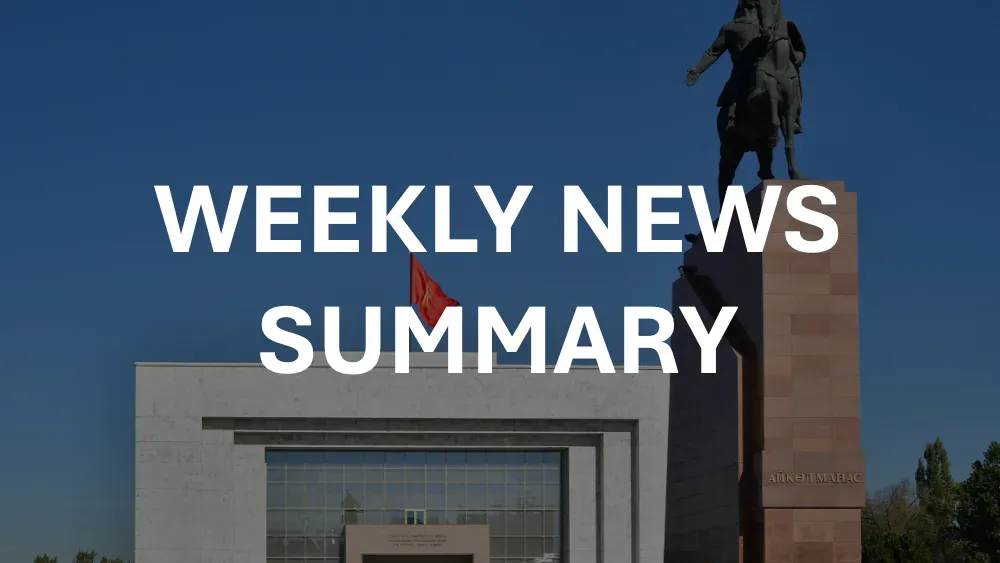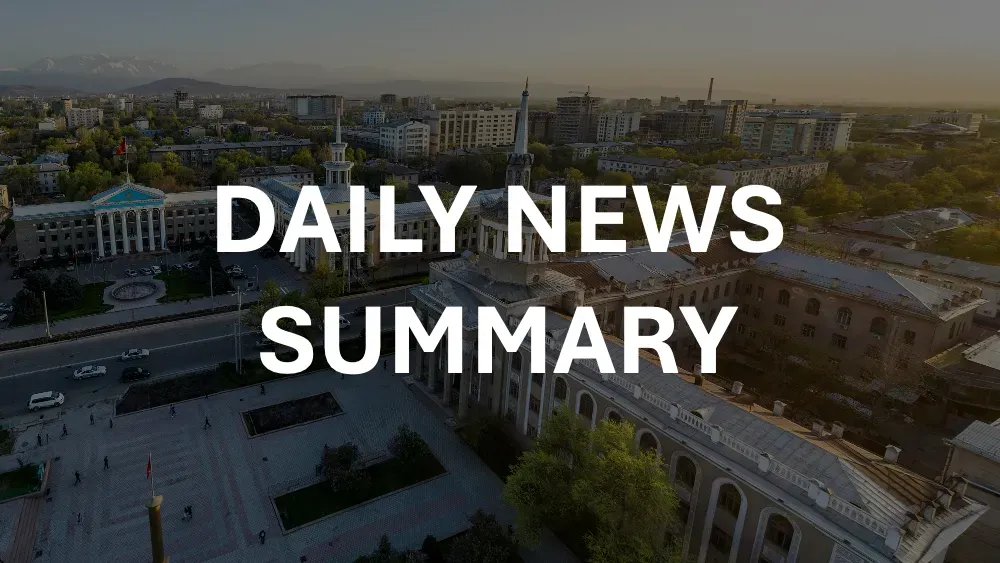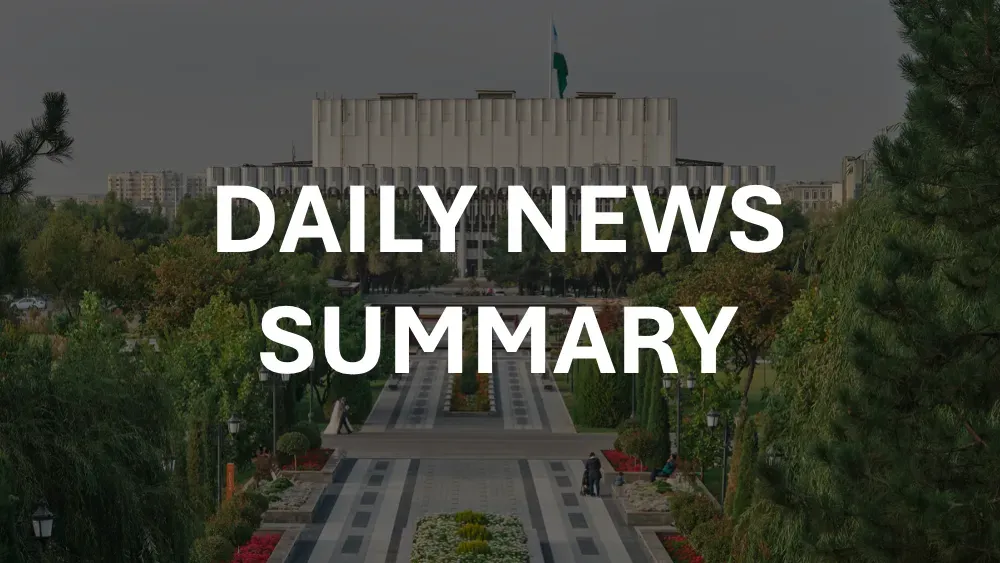This weekly digest showcases just 10 stories. Daily subscribers receive comprehensive intelligence briefs with 40 of the top stories organized by category. Don't miss the stories that matter.
Subscribe to Daily →
October 17, 2025 to October 23, 2025
This week's top 10 stories from Kyrgyzstan, selected from our daily intelligence briefs.
1. Bishkek and Washington Reaffirm Drive to Deepen Ties, Discuss C5+1 and Visas
Kyrgyz Foreign Minister Jeenbek Kulubaev met U.S. Ambassador Leslie Viguerie in Bishkek to reaffirm a broadened Kyrgyz–U.S. cooperation agenda, including coordination within the C5+1 regional format. Both sides prioritized intensifying political dialogue and expanding trade, investment and joint projects; Bishkek signalled a push to attract more U.S. capital and increase American business participation, while visa issues were discussed separately. The meeting closed with mutual commitments to deepen engagement and maintain regular working-level contacts, outlining a pragmatic, outcome-driven trajectory though no specific initiatives or timelines were disclosed.
Separately, Kyrgyz Parliament Speaker Nurlanbek Turgunbek uulu received India’s new ambassador Birender Singh Yadav to advance political, economic and cultural ties and step up inter-parliamentary cooperation. The speaker highlighted priorities to raise trade turnover and strengthen education and healthcare collaboration—including oversight of medical schools to improve quality for international students—while the ambassador emphasized India’s interest in broad sectoral cooperation and in organizing bilateral and Central Asia–India format events to boost parliamentary links.
Local Coverage: kabar.kg
From daily brief: 2025-10-23
2. Central Asian States and China ‘Everlasting Good-Neighborliness’ Pact Ratified by Bishkek
Kyrgyzstan has completed domestic ratification of the “Treaty on Everlasting Good-Neighborliness, Friendship and Cooperation” with China and five Central Asian neighbors: Kazakhstan, Tajikistan, Turkmenistan and Uzbekistan. Signed in Astana on June 17, 2025, the agreement was approved by the Jogorku Kenesh on September 24, 2025 and formally ratified by President Sadyr Japarov, clearing Kyrgyzstan’s steps to bring the treaty into force.
The pact formalizes multilateral political ties with Beijing and signals a regional commitment to long‑term stability and cooperation across security, trade and connectivity agendas. For international stakeholders, ratification may simplify cross‑border coordination and investment planning by anchoring a shared framework among all Central Asian republics and China, though no implementation measures or timelines were specified.
Local Coverage: kabar.kg
From daily brief: 2025-10-24
3. EBRD Weighs Up to $1.5 Billion for Kambar-Ata-1 Hydropower Project Covering Kyrgyzstan, Kazakhstan, Uzbekistan
The European Bank for Reconstruction and Development (EBRD) is proposing up to $1.5 billion in financing for the 1,860 MW Kambar-Ata-1 hydropower plant, a project positioned as one of Central Asia’s largest renewable-energy initiatives and intended to supply electricity to Kyrgyzstan, Kazakhstan and Uzbekistan while supporting regional irrigation. The envisaged financing would take the form of three sovereign loans of $500 million each, pending consultations with partner institutions and EBRD board approval; the move builds on a prior €900 million memorandum signed by the EBRD, the European Investment Bank, the European Union and the three governments to advance implementation.
EBRD President Odile Renaud-Basso framed the push as driven by declining technology costs and the economics of decarbonization, noting growing regional interest in renewables. For international stakeholders, the proposal signals increased multilateral investment in transboundary infrastructure with implications for energy security, water management and regional cooperation, but remains conditional on partner alignment and formal approvals.
Local Coverage: 24.kg
From daily brief: 2025-10-23
4. CIS Security Chiefs Convene in Samarkand to Coordinate Intelligence and Border Measures
Security and intelligence chiefs from CIS member states met in Samarkand on 16–17 October to coordinate responses to regional threats and harmonize operational practices. Kyrgyzstan’s delegation was led by Kamchybek Tashiev, chairman of the State Committee for National Security (GKNB), who urged improved inter-agency coordination and faster information-sharing; he also held bilateral talks aimed at enhancing border cooperation and incident-prevention mechanisms.
The session produced agreed decisions to deepen cooperation among CIS security bodies and sharpen joint cross-border risk management, though participants did not publish specific measures. For international professionals, the meeting signals continued integration of intelligence efforts within the CIS framework and a practical shift toward operational interoperability on frontier security — developments that could affect regional incident response, intelligence exchange protocols, and border-management practices.
Local Coverage: 24.kg
From daily brief: 2025-10-18
5. Foreign Student Numbers Fall Sharply as Student Visas Drop Fourfold
International student enrollment in Kyrgyzstan fell 31% in 2023–2024, with the sharpest drops among Uzbek students (−53%) and Indian students (−13%), reflecting a broader decline in new visas: the Foreign Ministry reported only 11,645 student S visas issued for 2025, roughly one-quarter of the prior year’s level. Findings presented at a roundtable hosted by the Ombudsman’s Office, civil-society group Oasis, and the Friedrich Ebert Foundation attributed the downturn to safety concerns, rental barriers, extortion, discrimination on public transport and limited cultural integration.
Surveyed students reported high levels of mistreatment—42% indicated they had faced threats and 14% reported sexual violence or harassment—yet only 22% of those experiencing rights violations contacted law enforcement, according to Oasis head Meerim Osmonaliyeva. Deputy Ombudsman Zhanibek Zhorobayev stressed state obligations to protect noncitizens’ rights: the data point to reputational and regulatory risks for Kyrgyz higher education and call for strengthened monitoring, anti-discrimination measures and targeted support to restore international enrollment.
Local Coverage: 24.kg
From daily brief: 2025-10-18
6. Parliamentary Race Cast as Next Phase in Anti-Corruption Drive with New Voting Rules and Warnings on Vote-Buying
A commentary ahead of Kyrgyzstan’s upcoming parliamentary elections frames the vote as the next phase in an anti‑corruption drive after electoral reforms that replace party lists with 30 single‑mandate districts, allowing voters to choose individual candidates rather than parties. Authorities have introduced electronic vote counting and barred officials from campaigning to bolster integrity, while President Sadyr Japarov publicly urged citizens not to sell their votes and to reject candidates who rely on paid canvassers and gifts.
Analysts and former officials describe the contest as a test of “popular lustration” meant to exclude oligarchic and criminal influence and sustain reform momentum; former MP Zainidin Kurmanov and academic Cholponkul Arabaev emphasize that selecting qualified, ethical deputies is crucial for durable clean governance. The outcome will be watched as an indicator of whether institutional changes and public pressure can reduce vote‑buying and improve representative accountability.
Local Coverage: kabar.kg
From daily brief: 2025-10-23
7. Early Parliamentary Poll Draws 437 Candidates as Voter List Verification Nears Deadline
Kyrgyzstan’s Central Election Commission (CEC) reports 437 candidates have filed to contest snap parliamentary elections scheduled for 30 November, with candidate registration remaining open until 30 October and campaigning to begin on 10 November. The CEC has put more than 4.287 million voters on preliminary rolls and urges citizens to verify their registration by 30 October; 2,492 domestic polling stations and 71 overseas stations across 33 countries (including single stations in the UK, France, Japan, Saudi Arabia, India and Uzbekistan) will be available. Applications for out‑of‑country voting close on 28 November, with results expected by 14 December.
The compressed timeline concentrates candidate finalization, voter verification and campaign launch into a three‑week window, raising logistical and administrative pressure on election bodies, parties and independents to mobilize and vet slates quickly. The CEC’s rollout of test voting at all polling sites and three additional remote access points in Bishkek (Dordoi/Alkan market, Asia Mall, Dordoi Plaza) signals institutional readiness, but turnout, candidate quality and the effectiveness of technical preparations will be decisive for the post‑election political picture.
Local Coverage: kabar.kg, 24.kg
From daily briefs: 2025-10-21, 2025-10-23, 2025-10-24
8. Public–Private Partnership Portfolio Expands as Updated Investment Laws Take Effect
At the 4th International PPP Conference in Bishkek (2025), First Deputy Chair of the Cabinet Daniyar Amangeldiev outlined Kyrgyzstan’s strengthened framework for public–private partnerships following the entry into force of updated “On Investments” and “On PPP” laws in 2025. The reforms aim to standardize transparency, equal guarantees and long-term investor conditions; Amangeldiev framed PPPs as central to sustainable growth and called on regional leaders to accelerate project initiation.
The PPP Center’s portfolio now exceeds 90 projects valued at over 434 billion KGS, with more than 10 agreements signed in the past year and over USD 3 billion in investment attracted; domestic financial institutions also began participating in PPP implementation in 2025. For international and private investors, these developments signal clearer legal protections and an expanding pipeline, though successful mobilization will depend on regional execution and continued institutional coordination.
Local Coverage: kabar.kg
From daily brief: 2025-10-24
9. Smart Farming Partnership Signed to Modernize Agro-Industry
Kyrgyz Agroholding JSC and South Korea’s Dohwa Engineering signed a memorandum of cooperation in Seoul during Korea Business Week 2025 and the Export Boom-Up Korea Week exhibition, committing to deploy smart-farm technologies across Kyrgyzstan’s agro‑industrial sector. The Ministry of Water Resources, Agriculture and Processing Industry says the agreement will promote bilateral innovation, knowledge exchange and joint projects to digitize and automate operations—irrigation, climate control and data-driven crop management—with the objective of raising yields, improving resource efficiency and enhancing export readiness.
For Korean firms, the deal opens a commercial entry into Central Asia’s growing agricultural market by enabling technology deployment and project development; for Kyrgyzstan it represents a strategic modernization push that could materially impact productivity and sustainability in national food production if implemented at scale.
Local Coverage: kabar.kg
From daily brief: 2025-10-23
10. Election Commission Sets 700 Million Som Budget for Early Parliamentary Vote
The Central Election Commission has approved a 700 million som budget to prepare and conduct snap parliamentary elections set for 30 November. The allocation, calculated against operational indicators, is intended to cover core logistics — polling station operations, ballot production, voter list management, staff training, security and technology support — and signals a full-scale, expedited nationwide mobilization.
For international observers and stakeholders the confirmed budget establishes the procurement and deployment framework and sets timelines for contracting and readiness benchmarks; detailed line items were not disclosed. The decision also raises expectations about the Commission’s administrative capacity and cost controls during the compressed pre-election period, with implementation specifics expected to appear in forthcoming procurement notices and CEC updates.
Local Coverage: 24.kg
From daily brief: 2025-10-17
About This Weekly Digest
The stories above represent the most significant developments from Kyrgyzstan this week, selected through our AI-powered analysis of hundreds of local news articles.
Stories are drawn from our daily intelligence briefs, which synthesize reporting from Kyrgyzstan's leading news sources to provide comprehensive situational awareness for international decision-makers.
These weekly highlights are a small sample of what's happening. Daily subscribers get comprehensive briefings with 40 top stories that connect the dots between events, track developing stories, and provide the context you need for informed decision-making.
Upgrade to Daily →






